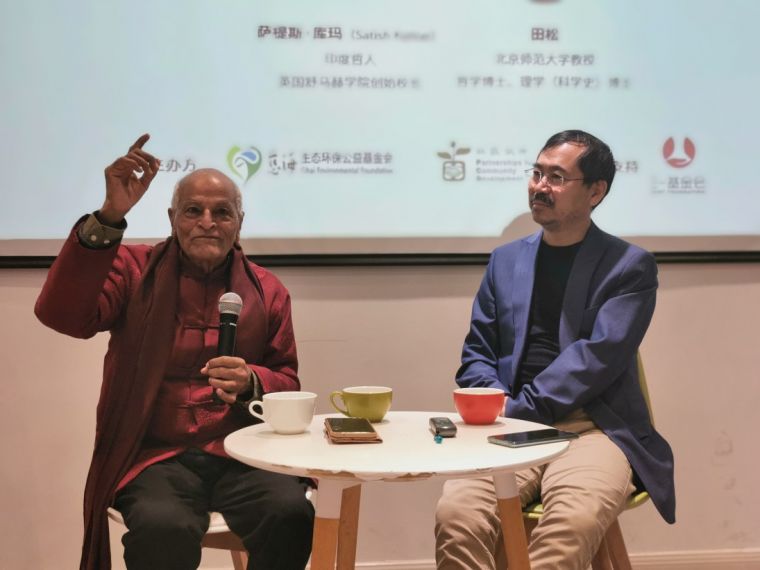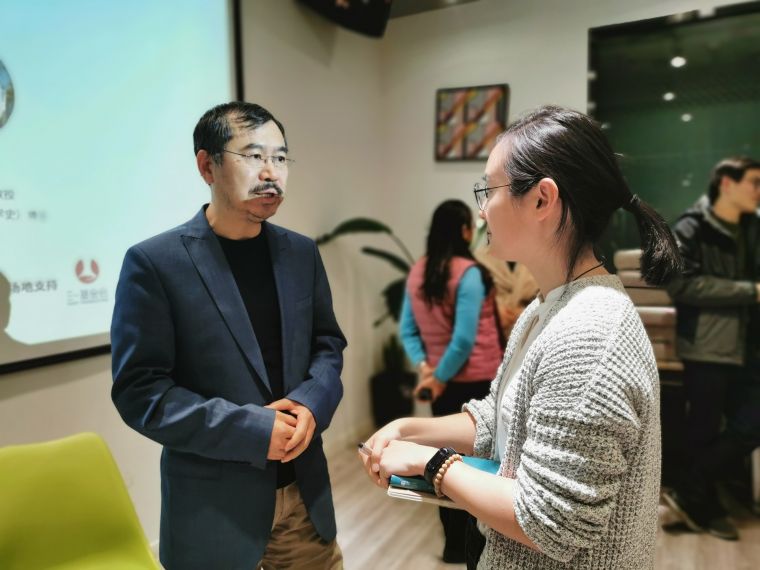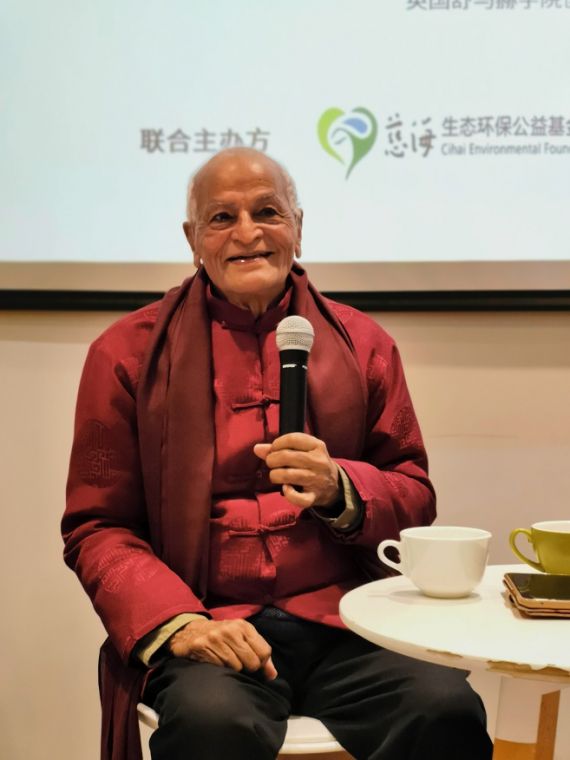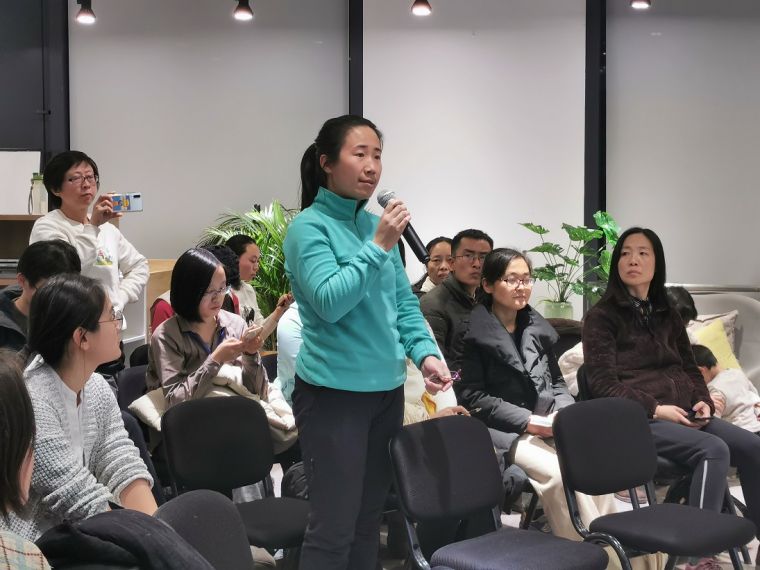On 14 December 2019, Cihai Environmental Foundation (Sources for Action) and Partnerships for Community Development (PCD) Beijing Representative Office jointly invited Satish Kumar, founder of Schumacher College, and Tian Song, Philosophy Professor of Beijing Normal University, to discuss Ecological Civilisation and Holistic Education. We share their conversation, which we have only partially edited.

Tian Song: Science and Civilisation
I’m very honoured to be here tonight. My academic background covers Physics, Science History and Science Philosophy; thus, my reflection on industrial civilisation begins with science, especially with my research on waste which has come to some astonishing conclusions.
Anthropocene
There have been several geological periods, such as the Holocene and Paleocene. We are now living in a new one, called the Anthropocene, which means that the momentum of human activity has reached the same magnitude of volcanoes, earthquakes and tsunamis.
For example, nuclear dust has been floating in the atmosphere since the three nuclear explosions in 1945, with radioactive substances detected in wine ever since. Human activity has not only changed atmospheric structure, but the global water system too. In China, traditional agriculture, which represented an idyllic dream and has been depicted in literature for millenia, was very eco-friendly. However, it has changed thoroughly with the boom of industrial agriculture. Pesticides, chemical fertilisers and manufactured minerals are used day after day, year after year, causing the largest material transportation on earth – equivalent to a long-term geological process.
We might first see these as expressions of human potential, but more and more, they have led to problems such as global warming, ozone depletion, the endangerment of species, and rising sea levels. Of course, science has helped push forward all of these changes.
The Traditional View of Science and Technology
At the beginning, when science and technology were developing, it was always said that it was for the benefit of humankind. Nowadays, we often say that science is the exploration of the mysteries of nature, a discovery of the laws of nature, and that science and technology will benefit humankind.
Science and human happiness have been seen as being intrinsically related, that science has an unquestionable moral superiority – that if you are a scientist, you are a good person doing good deeds. What image of a scientist do we have in our minds? Scientists are a group of high-minded, intellectual people. In pursuit of truth, they would forever regret a thousand deaths, and out of love for the Motherland and our people, they would rather give up a well-paid job and return to their home country.
But think about it. In Newton’s book Mathematical Principles of Natural Philosophy, he regards himself as a philosopher exploring nature in a mathematical way. In the past, Physics was called Natural Philosophy, and nowadays a doctor’s degree in physics is still called Doctor of Philosophy. Then how has it come to be that physicists, philosophers as well, created nuclear bombs that have killed and caused so much damage? It’s far removed from their original intention of exploring nature and benefiting humankind.
Re-understanding Technology
In 1962, Silent Spring, written by American marine biologist Rachel Carson, was published, causing a rethinking of science and technology. For the ordinary person, a nuclear winter might feel far away, but the disasters Carson depicted were close at hand. People began to see the negative effects of science in their immediate lives, even in their backyards through the use of pesticides on their plants. There were opposing views about science, and divisions existed among scientists as well.
So, we need to re-understand and re-evaluate science, scientists, and their roles and functions in our society. In China, until 2000, the thought that “science and technology is a double-edged sword“ was openly discussed – we grouped science, technology, and society together, believing that when science advances, technology develops, and we can then learn about and transform nature better, and our society would in turn be better. Note the hidden value judgment here: that we have the right to transform nature as we like.
Civilisation from the Perspective of the Environment
Now we add a fourth dimension: environment – science and technology, society and environment. This significantly changes any evaluation of a tech-product. From the perspective of science, technology and society, pesticides and chemical fertilisers help increase grain production, help humankind master higher productivity, and help promote socio-economic progress. Adding the environmental perspective, we have to acknowledge that industrial agriculture has been a large source of severe pollution. Yet, only by including this dimension can we discuss the essence of civilisation.
Why should we turn from industrial civilisation to ecological civilisation? What is ecological civilisation exactly? And what role should science play? In what way should we individuals live, and what life is a good life? All these questions deserve our serious review, rethinking and re-evaluation. Thank you!

Satish Kumar: Holistic Education
I would like to thank all of you for coming this evening!
Inner Transformation
Professor Tian Song has discussed four dimensions: science, technology, society, and ecology. I would like to add a fifth dimension. The four dimensions are very good, but are all related to the external world. What about our inner world? We have a mind. We have a heart. We have consciousness. Unless we have a transformation within our consciousness, in our mind, in our heart, the change outside will not be enough.
The first change of heart we need is to see that nature ‘out there’ and human beings ‘here’ are not two separate entities. Science and technology, particularly science, has divided nature and people. Science has put us above nature. We think that all of nature is only for the use of human beings, that the human race is the supreme race. We are in charge of the planet. We are the rulers of the planet. So we can do to nature what we like, it’s our nature for our use. This mindset, this worldview, has to change.
Born in Nature, Belong to Nature
We have to say that nature and humans are not separate. We are also nature. The word ‘nature’ means ‘birth’ in English. When a mother is pregnant, she goes to the hospital for a pre-natal check, and after the birth she has the postnatal check. ‘Natal’ and ‘nature’ come from the same root. ‘Native’ does too. If you say ‘I am a native of China’, it means you're born in China. So, anybody, and any creature, is born in nature. We are born. So how can you say we are not nature, that nature is only out there, that the animals and the forest and the oceans and the mountains are nature, but we are not? We are born. We are also nature.
Unity
At the quantum physics level, we are all one. So this is what I call inner transformation. If our minds are dualistic, that we are separate from nature, then our mindset ill be full of ideas that we have to conquer nature, control nature, subjugate nature, and use nature for our benefit. If this is our mindset of greed and control and domination, then no science, no technology, no ecology, no sociology, and no external recipient can help. We have to realize that forests and animals and mountains are made of the same elements that we are made of. We all have one single origin. We have all come from the Big Bang. And we are children of the ocean, the mountains, the forests, the animals, and the chimpanzees. We are the children of nature. And therefore, the rights of the human are only one of many rights – there are rights of nature, rights of the earth.
So the pollution of the planet happens when our minds are polluted. Our minds are polluted with the idea of dualism, separation, domination, control, and greed. And more importantly, the ego. All universities teach us to be egotistical, they teach you to get a job that will make you successful. What is success? When you make lots of money, buy a big house, a big car, and have a big salary, which will destroy the planet? That doesn't matter. As long as you make a lot of money and have a big car, a big house and a Nobel Prize and control and power, you're successful. This is the university education. The universities have been polluting our minds. With our polluted mind, we go out and pollute the planet. At the university, they look at you as a student, as young people, and they say, you have no body, you have no hands, you have no heart, you have no legs, you have no body, only a brain. So they only teach that you have a brain and they pollute the brain.
Walking University
I did not go to university. I went walking. I went walking for two-and-a-half years. My university was a walking university. I walked 8,000 miles in two-and-a-half years. I walked from New Delhi to Pakistan, Afghanistan, Iran, Azerbaijan, Armenia, Georgia, Russia, Moscow. And then I walked from Moscow to Belorussia, Poland, Germany, Belgium, France. I walked for two-and-a-half years without any money in my pocket. If you want to see the world, just go walking. You don't need any money. Wherever you go, there is land, and land produces food. Wherever you go, there are trees, and trees produce apples and mangoes and papayas. And I did not eat meat for two-and-a-half years, no meat, no fish, only a vegetarian diet.
Even though I did not go to university, I started Schumacher College. We started Schumacher College to stop the pollution of the mind. At Schumacher College, students have education for the brain, but also for the heart, hands and legs. We teach holistic science, Gaia theory, Deep Ecology; we teach complexity theories like quantum physics. But also we teach spirituality. We teach meditation. So it’s about learning, living, and loving.
Love Education
Holistic education is to learn from our whole body, and learn in our mind and body that we are a microcosm of a macrocosm. The entire planet Earth, the entire universe is our body. I am earth, air, fire, water, consciousness. I am the sun and the moon. I am stars. The moment you have that unity with the cosmos, then your science, your technology, your sociology, and your ecology has a different, profound and deep meaning. And when I have such a big mind and a big heart, then my relationship with the natural world is not of greed, but of celebration. We in the modern world are so busy working on computers and machinery and offices and shops that we have forgotten to celebrate life. Celebration comes from your heart, the place of love.
Before we can protect the environment, and protect the planet, we have to love the planet, love the environment, love nature. Love is the foundation of science, technology, sociology and ecology. So, apart from the four points of the professor, I add the fifth point, which is love. Without love, human life cannot be of any good use. If you are a teacher, teach because you love children and you love knowledge, not for money, but for love. Teach for love, and money will come. If you're a doctor, what is important in a hospital? Not the big hospital building, not all the modern machinery, not all the medicine coming from all over the world. All of that is secondary. It’s the love in the heart of the doctor and the nurse to heal the sick. If that love is missing, you can have hundreds of kinds of machinery and thousands of medicines and fancy buildings, but no healing will take place. Medicine and machinery and buildings are just by the way, they are means to an end. If you are an entrepreneur and businessman, what is important for a business? Not the bank balance, not the balance sheet, not the things you are buying and selling, and exporting and importing. What is most important in business? It is the trader who is trying to love the community that needs clothing, shoes, housing, who needs all these things. So out of love, we go and do business, and then we earn money. But it's the love that informs the business. And that becomes a good business.
Love has nothing to do with religion, cult, dogma or any kind of doctrine. Love is just the opening of the heart, and the feeling and celebration and appreciation of our relationship with the trees and the flowers and the water and the rivers and the oceans, and the people and the future people too. So, science, technology, sociology, ecology are very good for the outer transformation. Love, compassion, a change of worldview, and a sense of unity with life, that is inner transformation. When inner transformation and outer transformation are walking on two legs, side by side, in and out together, then we have holistic education. I don't think the Communist Party will have any objection to this revolution. You have had one revolution in 1949, and now we are in 2019 – let China lead the new revolution, a love revolution. Thank you!

Q&A
Q
I’m from Vanke Foundation and responsible for waste management. I also realize that the development of technology couldn’t solve social and environmental problems. What we are doing now is not in the mainstream and not influential, so how should we go forward – shall we work to help people realise the problems at hand, or keep doing our work, our part, as a counterweight to science and technology?
Satish Kumar: The world always has problems. And we'll always have problems in the future. And there are always problems in the past. So we have to act to protect the planet, to clean the waste with a step-by-step approach. Our traditional education teaches us to get results very quickly. But true life is not about results, not about solving problems, but about living day by day. So your waste management is a part of our living. Because you love the planet, you don't want to see waste, you want to reduce the waste. Wonderful! Just keep doing it. And don't worry if nobody listens to you. Your action is good in itself. If other people listen to you, good. Good! But don’t expect the result; action itself is your reward. Activism is a journey, not a destination.
As long as we are thinking about results, outcome, and achievement, we will never be happy and satisfied. What did Buddha achieve? What did Laozi, Confucius, Mahatma Gandhi, and Mao Zedong achieve? They did not achieve everything. They just acted. So my advice to you is to act without expectation of results and success; action itself has intrinsic value.
Tian Song: I think highly of your work in waste management. Sadly, my research on the waste crisis reached a conclusion that in industrial civilisation, waste can never be solved by any technology.
New technology only produces more complicated waste. Thus, human beings will face two problems for a very long time. The first is the waste we have already produced. According to the Gaia theory, if the waste stays there safely, like a stone in Gaia mother, this is the best. Yet, it will likely explode or spill, causing complex reactions and a second round of pollution: an ulcer or cancer in Gaia mother.
The second problem is that we will keep producing and dumping more and more waste into nature as our industrial civilisation continues. We’ll keep finding new landfills and building incineration plants. So, we must find a new mode of civilisation.
In 1948, in the foreword to A Sand County Almanac, Aldo Leopold, the prophet of ecological thought, wrote: Now we face the question of whether a still higher standard of living is worth its cost in things natural, wild and free. For us of the minority, the opportunity to see geese is more important than television, and the chance to find a pasque-flower is a right as inalienable as free speech. Aldo Leopold discusses two values. First, if the majority thinks televisions and mobile phones are so important, then constantly upgrading these products will definitely produce more waste. Second, if the majority can find joy in nature, appreciating birds flying and flowers blossoming, then we have the possibility of building an ecological civilisation.

Q
I heard a lot about love from Mr. Satish Kumar. I want to know more about how you understand love? How do you celebrate life, incorporating nature and love together? What is it like at Schumacher College?
Satish Kumar: Love is to accept life as it is, without expectations, without judgement, without conditions, without complaining. So when you fall in love with a man or a woman, you accept the man and woman as the man and woman. No judgment. You don't say I love you because you are rich. I love you because you're educated. I love you because you're beautiful. I love you because… No because, just I love you, full stop. Then I participate in the life together with you. I cook with you, I walk with you, I travel with you, I read a book with you, I participate in life together.
I expect nothing from my wife. I say to her, be as you are, don't change. I love you 48 years ago, I love you still. It’s not that I fell in love with you 48 years ago, but I love you and celebrate love every day, every moment. Love is not history, love is the present moment. Love is not future, love is right here and right now. When I love you, I don't want to change you to suit my need or change you to fit my idea of you. I want you to be you as you are. And I love you as you are. Don't change for me. If you want somebody to change for you, you're not loving him/her. You're expecting something. Without expectation, accept the other as the other is. This acceptance without expectation is love. Humanity is not accepting the universe as it is, they always try to change, to improve, cutting down rainforest to make soya beans or cutting down forests to build airports because we think a forest is not good enough, not developed enough. That's not love. That’s destroying what is.
When you come to Schumacher College, the first thing I would tell you is you have come here to fall in love. First of all, fall in love with yourself. You can't love somebody else if you don't love yourself. Loving yourself is not selfish. You love yourself, and you love him, you love sun and moon and star, you love day and night, you love everything! And so that is the love revolution. Love needs courage, love fears nothing. Loving yourself is an inner revolution; you have to bring this revolution into your personal life!
I want to say something about how we celebrate in Schumacher College. We celebrate every morning by everybody coming together. Every morning, we have a community meeting; we read poetry, we tell each other what we are going to do today, and we sing together. Science, Math, Ecology, Sociology, History, these are all fine. But if you have children, let them learn these in school, and teach them to sing. Singing and dancing is the best way to celebrate.
And then you go out and stand under a tree and look at the tree, and celebrate what a miracle of nature it is. These flowers that blossom, this blue sky, the sunshine, these clouds, this beautiful rain. Celebrate every moment of life – the wonder, magic, miracle, everything! There's every moment to celebrate. We have forgotten. We sit in front of the computer or mobile phone. Look! Look and celebrate! Be happy while this magical world is wonderful. Why don't we celebrate? And we think, oh, I want more money, I want more business. I want this. I want that. You would never have enough if you just wanted. But if you love and celebrate, you have everything. You have got imagination. You've got love, you've got heart, you’ve got courage, you’ve got consciousness, you’ve got everything!
Tian Song: Mr. Satish Kumar has very infectious enthusiasm. I want to add that in modern society, many people lack confidence; at the same time, they are also egocentric, because they don’t have a sound ego.
They only ask and take, yet don’t give. They tend to abandon their responsibility. We may call these people “childish adults” with an extreme egocentrism that is actually a lack of confidence, because their understanding of the world is not based on an independent self. So we need to build confidence and grow to maturity, slowly – then we can love. When we trust ourselves and trust our judgement, we won’t follow mindless pursuits of new phones, fancy bags, big cars or houses, since the real wisdom lies in the courage to relinquish this. When we are mature and abundant within, we will fully experience the power, spirit, abundance and joy in nature.

Q
I want to ask Mr. Satish where love comes from. How did you connect with nature and all things?
Satish Kumar: My love for nature comes from my mother. When I was three or four years old, she would take me walking in nature. My mother would bring me to a beehive, saying this honeybee goes from flower to flower without harming the plants, taking a little nectar here and a little nectar there, but never too much. No flower ever complains that a bee has taken away too much nectar. And then, the nectar is transformed into delicious, sweet, healthy, healing honey. We have to do the same! We can take from nature like a bee takes from a flower; we then have to transform it not into waste, but into honey. As we do so, we pollinate each other with love. The bee is a supreme example of love. That’s how I learned to love nature.
If you have children, leave your mobile phone behind at home and take them out walking in nature, to appreciate the beautiful mountains, to breathe the fresh air. It’s a way to love your child, who will fall in love with nature. A mother is the most supreme example of love: she loves the husband, she loves the child, and she loves to produce the child, even though it’s a life and death experience. Love is not easy! Therefore, every mother is a hero, a source of love: you are a source of love. Love is a Yin principle, a feminine principle. You don’t have to look further. Look into your heart. Love is there.

Site translation: Zhang Lanying, Angus Lam
Record: Miao Jie

